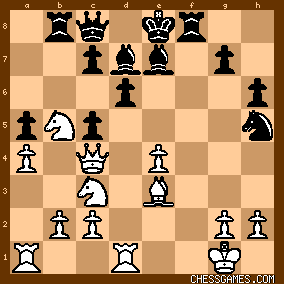KEG: Post II
Rosen's 18. Nd4 offered a poison pawn (at b2) to Mason. Had Mason taken the bait with 18...Rxb2, he would have been in big trouble (and probably lost) according to Rosenthal in the Tournament Book after 19. Nxc6 Rxc2? 20. NxB KxN? 21. Nd5+ "followed by QxR and wins." Mason could have improved on Rosenthal's line with 19...Bg5 but would still probably be lost. [20...KxN? was a blunder, but even after the "better" 20...Rxg2+ BlRxb2 Black is dead]. But Mason did not fall for Rosen's trap and instead of 18...Rxb2 played: 18... c5
This is better than 18...Rxb2, but hardly best. Mason should have played 18...Rb4 after which he would have had approximately equal chances. The text leads to trouble, especially given Mason's very poor next (19th) move. 19. Ndb5
The position was now:

click for larger view19... Be6?
This allows Rosen to play a pretty combination that leads to an endgame in which he is a pawn ahead. Once again, Mason should have acknowledged that moving his Knight to h5 was a mistake and played 19...Nf6. Although the game lasted another nearly forty moves, from this point on Mason was lost. Rosenthal in the Tournament Book claimed that the right move was 19...Nf4, but that would have been even worse than the text [19...Nf4 20. BxN RxB (20...BxN was better but also hopeless) 21. Qg8+ Bf8? (Rosenthal's move which would get crushed by 22. Nd5. 21...Rf8 was better but also unavailing]. 20. QxB!
20. Nxc7+ ! was another way to pick up a pawn and reach the identical winning endgame [20. Nxc7+ Kf7 21. NxB QxN 22. QxQ+ KxQ 23. Nb5. 20... QxQ
21. Nxc7+ Kd7
22. NxQ KxN
23. Nb5
This left:

click for larger viewMason was always a tough man to defeat in a endgame, so the pawn plus might not have been sufficient for Rosen to prevail. But Rosen's advantage is more than just his extra pawn; his Knight is powerfully posted, and Black has numerous pawn weaknesses. Absent a miracle, Mason must lose. As will be seen, however, Mason--recognizing his peril--hatches a plan to try to lead Rosen astray. 23... Rb7
Here again, 23...Nf6 was better, though now Black's game is beyond repair. 24. Bd2
A reasonable winning plan, but faster and better was 24. Ra3. 24... Ra8
Mason is fishing for complications. But, on any reckoning, 24...Bd8 was much better. 25. Ra3 Nf6
26. Re3
Sufficient, but more enterprising were 26. Rg3 or 26. Rf3. In either case, 26...Nxe4 would be met by 27. Re1. 26... Ne8
27. Bc3 Bf6
The defensive task is wearing Mason down. The trade of Bishops only benefits White. Mason might have tried 27...Ra6 or perhaps 27...Rd7. 28. BxB gxB
28...KxB was surely better theoretically, but Mason decides to go for broke and--even at the cost of another pawn--try to get counterplay on the g-file. The position was now:

click for larger viewAs is apparent, Mason's game is hanging by a thread. But it was here that he tried his final swindle in an effort to save the game, as I will discuss in my next post on this game. | 




